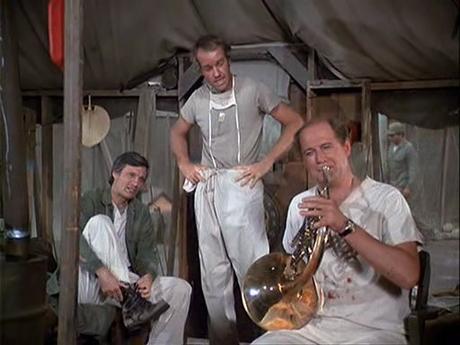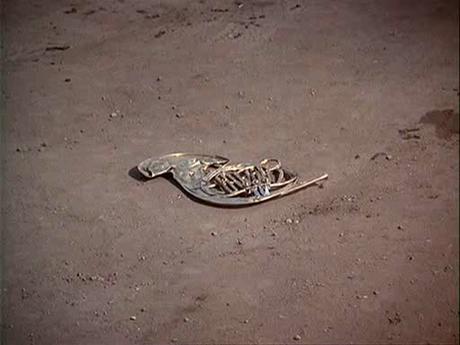by Paul J. Pelkonen

As Major Charles Emerson Winchester III, David Ogden Stiers (right)
torments his tentmates (Alan Alda and Mike Farrell) in the M*A*S*H episode The Smell of Music.
Image © 1970 20th Century FOX/CBS
For six years, Mr. Stiers played the role of surgeon and army major Charles Emerson Winchester III on the CBS sitcom M*A*S*H. He joined the show in 1976 as a replacement for actor Larry Linville, who played series antagonist Frank Burns. Major Burns was cruel, priggish and an incompetent surgeon. Major Winchester was created as his exact opposite: cool, cultured and most importantly for this blog, a lover of classical music and opera.
This talented man and the character he played so well were as much a part of my growing up as listening to Beethoven and Bernstein. Major Winchester was the scion of a wealthy Bostonian family, an upper-crust snob whose taste in music ran from Mozart (in his very first episode, "Fade Out, Fade In") to the heavyweight works of Wagner, Mahler and Richard Strauss. Winchester's love of these "high-falutin'" composers was often played for laughs and met with puzzlement by his fellow surgeons, Captain Hawkeye Pierce (Alan Alda) and Captain B.J. Hunnicutt (Mike Farrell.)
Take the Season Six episode "The Smell of Music." Charles gets into a turf war with Hawkeye and B.J. when he refuses to stop trying to play the horn solo from Richard Strauss' tone poem Don Juan. Sure, he doesn't have an orchestra to play it with, but Charles doesn't care: he keeps on trying to hit that high note. His tentmates respond by refusing to bathe. This conflict does not end well for any of them, including the horn itself:

Image from "The Smell of Music", © 1979 20th Century Fox/CBS.
As the show continued, (the Korean War lasted three years but M*A*S*H was on the air for eleven) Charles' passion for music became central to his character and something much more important than a running gag. His love of music was his refuge: his means for rising above the blood, death and pain that were central to life in a Mobile Army Surgical Hospital located only three short miles from the fighting.In this writer's opinion, the best "Charles" episode of the show is "Morale Victory" from Season Seven (1980.) Winchester operates on a soldier with leg and hand injuries. He saves the man's ability to walk, but leaves his patient with reduced dexterity in his right hand. Then he learns that the soldier is a concert pianist who got drafted, and now faces having to choose another vocation. The young man is devastated.
Charles persuades company clerk Max Klinger, who is traveling to Seoul, to (somehow) find the sheet music for Maurice Ravel's Piano Concerto for the Left Hand. This piece was written in 1929 for Paul Wittgenstein, a virtuoso pianist who lost his arm in World War I. Winchester wheels his patient to the Officer's Club and its upright piano, opens the sheet music and tells the young man to play it, with the following words:
"Don't you see? Your hand may be stilled, but your gift cannot be silenced if you refuse to let it be. The gift does not lie in your hands. I have hands, David. Hands that can make a scalpel sing. More than anything in my life I wanted to play, but I do not have the gift. I can play the notes, but I cannot make the music. You have performed Liszt, Rachmaninoff, Chopin. Even if you never do so again, you've already known a joy that I will never know as long as I live. Because the true gift is in your head and in your heart and in your soul. Now you can shut it off forever, or you can find new ways to share your gift with the world==through the baton, the classroom, or the pen. As to these works, they're for you, because you and the piano will always be as one."The young man then plays the solo part from the first movement. Winchester sits there enraptured and deeply moved. When he returns to the Swamp, Hawkeye and B.J. razz him about missing the big camp party that they just threw. Charles looks at them and says, with his characteristic delicacy, "Gentlemen, each of us must dance to his own tune."
In his later life, the actor was a frequent guest performer on television and a voice actor, creating Cogsworth in the Disney film Beauty and the Beast. He did much for the cause of music education, and in recent years, served as a conductor in Newton, Oregon, leading regular orchestral concerts.
Goodbye, Mr. Stiers, you will be missed.

